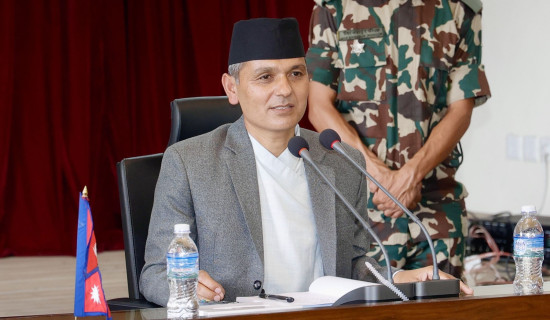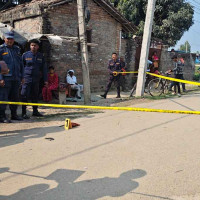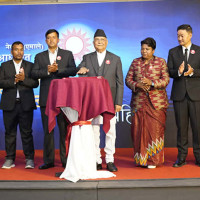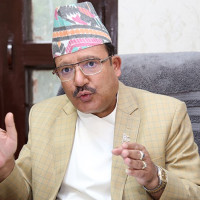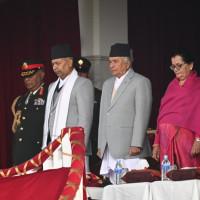- Friday, 20 February 2026
Monetisation Of Politics Injurious To Democracy
Money is a vital element of any democracy. Certain levels of autonomy on money and income empowers people’s active participation in political activities, representation in parliament, various institutions of governance and increases their political efficacy. The zeal of Nepalis for democracy is widespread.
Their fervent participation in political struggles in the various phases of the nation’ history, continuous social movements, relatively high voting turnout and political activism of various sizes, shape and scale tip-off their promise to democracy. Private property rights to the people have abolished the state of nature and made the state accountable to people’s life, liberty and livelihood.
This has also amplified the moral liability of property holders to spend part of their wealth in social development, public goods and national interests. Now Nepalis’ zeal for democracy is drying out by the act of the monopoly market producing an entropy and resultant cynicism where top leaders make abstract speeches promising many things but delivering little.
The reasoned political conversations, the pivot of a vibrant public sphere, are deeply weak to create civic culture. The rationale is the monopoly of political and money power by a tiny class whose communication style is still vertical. It is less inclined to create a level playing field for those who are outside its domain having no wherewithal to race with equal efficiency.
Denationalisation policy
The deindustrialisation, de-regulations and denationalisation policy of Nepali governments of various hues has steadily reduced the robustness of Nepali trade unions, informalised work, espoused labour market flexibility and passivity of workers while empowering the financial and corporate sectors boasting money and ability to allocate resources. If not effectively set limits to monetary imperialism and rightly regulated, it monetises all spheres of national life, stifles trust in political institutions and blurs the boundary between business and politics.
Monetisation of politics increases its costs and kills both ideology and volunteer aspect of solidarity. Nepal has witnessed how money has become an entry point to legislative politics, purchase of several lucrative posts by wealthy elites, business persons and special interests by financing electoral campaigns while making it costly for the powerless despite their ability. Can politics be revived to its classical dharma of serving public interests beyond the realm of money and muscle? It is difficult to answer right away so long as the market fosters consumer sovereignty depending on the power of money to exercise their choice of goods rather than a popular sovereign where all are equal.
Political scientist Werner Peters argues, “Money has become more and more powerful and is continuously subjecting, destroying and excluding other values.” He adds, “It has freed itself from all ties and now follows only its own law, the law of excess.” Its increasing digitalised mode of transaction, flow and use has made its mobility global while democracy is confined to demos of the nation. Nepal’s looming economic crisis which is affecting people and politics stems from the profitability of financial capital over labour, ecology, agriculture, industries, education, health and other productive activities which are the bases of its overall progress.
The nation’s main challenge is, therefore, how to bring money in a median site whereby it can serve not only digitalised transactions in banking and commerce and contest geopolitical boundaries but also the sovereign nation and people on whose writ democracy is grounded, stabilised and consolidated. Yet, the growth of political and economic syndicate in Nepal does not allow both democracy and market competition whereby ordinary people can shape the agenda of political life capable of responding to their vital needs. This is one of the reasons the government fails to stand for all people.
When many crucial posts of the state are sold for pecuniary benefits which have nothing to do with their meritocratic and credible performances, it carries the seeds of economic inequality and dominance of money in critical decision making through pressure politics, lobbying and behind-the-scene manoeuvre. The growing affiliation of Nepali leaders with wealthy business classes has weakened their ability to execute either the constitution or their party programmes benefiting the masses. This has barred the participation of disadvantaged sections of society in higher levels of decision-making, assumption of top leadership positions and enforcement of their accountability towards raj dharma, ethical concern to uplift those entailing political support.
The greatest threat to Nepali democracy arises from undue greed of elites who use political power to accumulate more and more wealth rather than abide by the rules of democracy which creates interdependent ecological, social, economic and political spheres and political participation is incentivised by leaders’ vow to public good. It is a key to transform transactional Nepali leaders into transformational ones. Nepal is also plagued by the excessive use of money in electoral politics to buy votes to win elections and seek favour from those in positions of higher authority to get things done and tolerate the rent-seeking activities later. Money is lubricant in the political system which oils the wheels of governance.
Money legitimately earned or not, is identified with contentment but its excessive use can easily cripple the democratic process and incubate a system of oligarchy or authoritarianism. This means the economy has to set a balance between the livelihoods for all Nepalis and enable it to deploy surpluses in the vocational life of competition, efficiency, profits and wellbeing. Reasonable tax system in the nation is exactly designed to subsidise the poor so that democracy shifts its prejudice from shareholders prerogative to a regime of stakeholders. Only then a robust democracy can foster the constitutional vision to grow an egalitarian society and make people real winners of the political game.
The return of privatisation of the state’s assets and its declining role in public affairs in no way democratises the society and curbs the influence of money in politics. Certain property rights and ownership of the wealth is good for people to exercise autonomy and freedom in matters of exercising reasonable choice in public life. Economic insecurity of people can easily subject them to the manipulation of powerful elites and yields them to the doctrine of necessity, not choice which democracy purports. But it is particularly central to control the influence of money in party politics, civil society and the parliament because it skews public policy making responsibility of leadership and undermines the equal distribution of public good to all people, even those at the bottom of development data.
The dynamics of money in the political process equally threatens democratisation of politics, its checks and balances, pluralism, security, education, health, justice and communication system. The adoption of neo-liberalism by Nepali governments of all hues has liberated money from social and democratic control, turned politics into petty calculation of self-interests and reduced the public's boundless hope for public welfare to dystopia. The existence of great scams in cooperatives, financial institutions, bank defaulting, tax-evasion, purchase of national properties, execution of development projects, etc. where comprador classes leave no surplus economy to alleviate the wretched life of the poor and overcome deficits of trade, growing debt and dependence, thus disrupting the order of democracy.
The collusion of powerful groups amply demonstrates as to how economic offenses such as money laundering, bribery, fraud and capital flights escape unhurt. The Nepali government aims to coordinate the Department of Money Laundering with anti-corruption watchdog institutions, law-enforcement agencies and judicial systems seeking economic predators to comply with national laws and international agreements and avoid falling the nation in the grey list whose further slither can risk global watch and cooperation. But the question is: Can the integrity and effectiveness of the leadership of those institutions and strong political be able to resist any temptation of selective use of laws and penalty.
Official words against the use of illicit money in politics may generate irrational elation without the ability of leadership to remedy them when they are connected to policy level deceit. This is why financial transparency and auditing of Nepali parties are getting public attention. Monetised incentives and wage labour is pulling Nepalis from rural to urban areas and abroad, increased divorce rate and occupational shift thus changing social structures, sane values and way of life. It has set the people in motion whose costs and consequence to social stability and national unity is less salient.
Fraying cultural bond
Postmodernism is permeating its intellectual culture and exonerating educated elites from social accountability to the people. So does modern media which is atomising the collective life of Nepalis. As a result, trends towards attention to digitalised news, views and commentaries is growing. Both the trends are breaking relationships with Nepali culture, values and spirituality infecting stress on national feelings, beliefs and worldview. Owing to the deficits of rational economic action and incubation of self-referential political class in Nepal, ordinary people are facing growing contradictions between their democratic aspirations and the sordid reality they face due to poverty, inequality, alienation and surging rage.
One can see how the moneyed classes have used democratic authority to enrich themselves, not financing all rights of people. It has become easy because most leaders hardly understand the language and logic of money and their economic advisors hardly know the dark political consequences of their prescriptions. The legitimate use of money by leadership in government can properly balance the utilisation of resources, labour, capital and technology and reap better outcomes for the people. To be sure democratisation, decentralization and apt regulation of money is indispensable to balance the asymmetry between the core and periphery and nurture democratic ideals in Nepali society.
(Former Reader at the Department of Political Science, TU, Dahal writes on political and social issues.)



